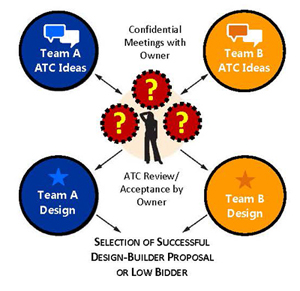Alternative Technical Concepts

What is the Alternative Technical Concepts (ATCs) Method?
State departments of transportation (DOTs) often look to contractors to provide innovative solutions that promote efficiencies, reduce risks, accelerate project delivery schedules and reduce project costs. Through a flexible highway contracting procurement method known as Alternative Technical Concepts (ATCs), contractors can submit innovative, cost-effective solutions that are equal to or better than the State's design and/or construction criteria. State DOTs and local transportation agencies have used ATCs successfully with traditional Design-Bid-Build (D-B-B) contracting, as well as with the Alternative Contracting Methods of Design-Build (D-B) and Construction Manager/General Contractor (CM/GC).
The ATC process has most commonly been used with the D-B project delivery and many resources are provided herein. However, the Missouri DOT has also used ATCs with D-B-B contracting and this new approach has shown much promise. The MODOT links found on this site under "Additional Resources" highlight this ACM work.
The basic ATC process is represented in the diagram above. An agency issues a request for ATCs as part of a Request for Proposal (RFP) on D-B projects, or Invitation for Bid (IFB) on D-B-B projects, which will contain basic project configurations, design and construction criteria. Individual contractors may then confidentially submit ATCs based on their industry expertise and the DOT approves or rejects them. Each contractor with an acceptable ATC may incorporate the concept into their proposal or bid and the DOT does not share them with other contractors prior to project award. This process allows contractors to submit innovative solutions and gain competitive advantage for them, while the DOT also selects the best-value proposal or bid that meets and potentially exceeds the basic project requirements. The ATCs may include concepts that accelerate project delivery, reduce travel impacts or include features desired by the DOT and/or the general public. The ATC approach fosters solutions that create greater project value for the public.
ATC Resources
- ATC Legal Authority or Enabling Legislation
- ATC Sample Manuals of Instruction
- ATC Procurement Documents & Templates
- ATC Contracting:
- Lessons Learned and Benefits Data
- Other Handy ATC Resources
ATC Legal Authority or Enabling Legislation
- State of Georgia: Chapter 672-18: Governing the Design-Build Procedures (.pdf) (Defined: 672-19-.02; RFP Requirements: 672-18-.07; Criteria for Providing a Stipulated Fee: 672-18-.10)
- Minnesota Statute 13.72 Subd. 11: Design-build transportation project data
- Tennessee DOT: Rulemaking Hearing Rules of the Tennessee DOT Construction Division: New Rules: Chapter 1680-5-4: Procedures for the Selection and Award of Design-Build Contracts (pages 8-9) (.pdf)
ATC Sample Manuals of Instruction
- Caltrans: Alternative Procurement Guide (pages 70, 83, 247) (.pdf)
- Florida DOT: Florida DOT Guidance on the Use of ATCs in Design-Build (.pdf)
- Minnesota DOT: Minnesota DOT Design-Build Manual Section 4.9
- Missouri DOT: Guidelines and Procedures for Alternate Technical Concept (ATC) Process (.pdf)
- Texas DOT: Texas DOT Chapter 223, Subchapter E, (See: Sections 223.203 (g), 223.246 (f),223.247 (a))
- Washington State DOT: Washington State DOT ATC Guidance Statement (pages 10-22) (.pdf, 2 mb)
ATC Procurement Documents & Templates
ATC Contracting
Confidentiality Requirements-ATC
- Minnesota Statute 13.72 Subd. 11: Design-build transportation project data
Request for Proposal (RFP) or Invitation for Bid (IFB) language regarding ATCs
- Mississippi DOT: Design-Build RFP (page 4) (.pdf)
- New Hampshire DOT: Draft Design-Build RFP (pages 3, 19) (.pdf)
Contract Provisions
- Colorado DOT:
- Instructions to Proposers: US 285 Reconstruction; Design-Build Project (Section 2; page 5)
- Maryland SHA: Maryland SHA US 113 Draft Special Provision (see Attachment 1)
- Mississippi DOT, RFP for Proposed Improvements to State Route 9; (.pdf) see "Pre-Proposal Technical Approach Modification Submittals, page 6.
- North Carolina DOT:
- South Carolina DOT: South Carolina, See attachments No. 1 and 2 for SCDOT procedures and contract provisions
- Texas DOT:
Lessons Learned and Benefits Data
- Using Alternative Technical Concepts to Improve Design-Build and PPP Procurements: Brian G. Papernik, David J. Farkas; March, 2009.
Other Handy ATC Resources
ATC Webinar Series
- Webinar 1: Introduction to Alternative Technical Concepts (Originally aired April 1, 2014)
- Webinar 2: Alternative Technical Concepts: Use with Traditional Design-Bid-Build Contracting (Originally aired June 5, 2014)
- Webinar 3: Alternative Technical Concepts: Use with Design-Build Contracting (Originally aired July 10, 2014)
- Webinar 4: Alternative Technical Concepts: Use with Construction Manager/General Contractor (CM/GC) and Public-Private Partnership (P3) Contracting (Originally aired August 21, 2014)
- Webinar 5: Alternative Technical Concept Development, Submittal, and Review (Originally aired October 15, 2014)
- Webinar 6: Alternative Technical Concepts - Legal and Legislative Issues (Originally aired December 16, 2014)

